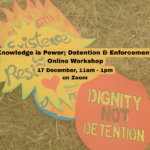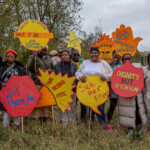This is an article by Ben du Preez of Detention Action, originally published by Open Democracy on 15 September 2015.
There was a strange sense of disconnect as attendees gathered in the foyer for the beginning of Right to Remain’s annual conference in London last weekend. On one hand, many were buoyed by the recent shift in tone towards migrants emitting from media outlets and decision-makers, a large number of whom had previously staked their lot on nefariously misrepresenting the very same peoples. The outpouring of public concern for those desperately seeking safety from persecution across Europe was also a cause for real, genuine hope. One local grassroots activist lamented that it had taken suffering of such epic proportions to correct Popular Opinion’s moral compass, but noted that even his habitually xenophobic aunt had said she had signed up to go on Sunday’s #RefugeesWelcome march – “things must be changing”, he grinned in conclusion.
Closer to home, however, it felt like there was little to smile about. Walking in to the conference, a member of the Freed Voices group called to say he couldn’t attend because the Home Office had thrown him out of his Section 4 accommodation last night, leaving him destitute, again, for the third time this year. Gathered around their morning coffees, some self-advocates spoke anxiously about the devastating cuts proposed for asylum support, whilst others updated one another on the recent spate of immigration raids across South and East London. Activists from the Midlands could be heard reflecting on the Home Office’s ‘Right to Rent’ pilot rolled out across their region, with its very specific designs to turn landlords into immigration officers and pit members of the community against each other.
Taking my seat before the first session began, I still had time to commiserate with a member of Beyond Borders Tyneside about the recently released immigration statistics. These new figures had shown little indication that the government is doing anything to address the moral bankruptcy, wanton inefficiency or financial flatulence of the detention estate, revealing instead that the number of people going into detention had risen by 10% from last year, up to 32,053; that, with no time-limit here in the UK, 187 people had been held in detention between 1-2 years in the year ending June 2015, with 29 held for 2 years or longer; and that one man had been incarcerated (without trial, remember) for over five years. All this only a few days after the news of another death in detention – this time of a 30-year old Ugandan asylum seeker, with a family and children based here in the UK.
However commendable the Prime Minister’s shift to become at least somewhat more humanitarian abroad, the ‘hostile environment’ at home clearly wasn’t any less belligerent towards those who had survived the horrors of the journey to get to the UK. And what did this say about the supposed ‘sea-change’ in government policy? Were we going to actually see any radical change of approach to immigration and asylum come out of this, or was it all stance, puff and rhetoric? These questions hung heavy in the air as the conference began.
The first session featured speakers fighting for LGBTI, workers and housing rights, and together they set the tone. Each gave an outline of their movement, their fight, the tactics they employ to combat the state oppression they or their clients regularly face. But the speakers also sought to explain how and where their respective struggles dovetailed with our own ongoing fight for migrant justice. Paul from UKLGIG spoke about the extraordinary levels of abuse facing gay, lesbian, bisexual and transgender migrants navigating the UK’s asylum and immigration systems; Percy from United Voices unpacked how triangular working relationships meant that he and other migrant workers are often left at the mercy of contractors’ inclination to divide and rule; and Jack from Housing Action Southwark and Lambeth explained how gentrification across London was proving a form of state-sanction violence against migrant communities. What emerged was a consensus that not only were these struggles inextricably connected but, moreover, there was a serious political cost in not linking them. Creating silos within the wider social justice movement was a victory for the perpetrators of these abuses, no-one else. ‘Solidarity’, was the word on everyone lips as we broke for lunch.
The second session re-focused everybody’s attention on detention – still the most extreme and pernicious form of immigration control practiced by our government and, as the Parliamentary Debate on Detention attested this week, one which continues to impact us all. Several of the 25 MPs who spoke in Chambers on Thursday noted one of the other astonishing statistics from the latest immigration figures; that 51% of all those incarcerated in the last year were released back into the community, their detention serving no purpose whatsoever. But reading that number and understanding its human translation are two different things. Here we heard from the communities themselves. One by one, representatives took to the floor and shared how detention affected their locality. They spoke about the paralysing fear of being detained, the shock-waves that ripple through a community when someone is detained, and the trauma of those released from detention and unceremoniously dumped, often in different communities to the one’s they were taken from. They spoke about the depression, the anxiety, the flashbacks, the suicidal ideation.
The geographical reach of the devastation wrought by these 12 detention centres was almost as alarming as the devastation itself. The Glasgow representative followed the Belfast one, then it was Exeter’s turn, then Cardiff, then Swansea, then Newport, Liverpool, Manchester, Leeds, Bradford, Rotherham, Sheffield, Dover, Newcastle, Bristol, London, Oxford, Malvern, Cheltenham, Slough, Birmingham, Coventry…on and on and on. Together, they formed a human map of suffering spanning the length and breadth of the British Isles. There was, however, a flip side to this regional-breakdown, as each representative also informed the rest of us what the local groups in their area were doing to support and protect individuals at risk. Representatives explained ‘signing-support’ mechanisms, signposted important info-hubs where groups could gather background on detention processes and their rights in immigration raids, and shared strategies for campaigning around reporting centre issues.
“Connections were made. Knowledge was disseminated. Networks were built.”
Soon, the hashtag #PeopleSupportingPeople was being used by those tweeting at the conference and resolve filled the room. ‘Solidarity’ was the word everyone sung to themselves when we went for the break.
The final session of the day explored local strategies to challenge national injustice, but it also left room for wider conversation about the complex causes of migration, the UK’s responsibility for these causes, and how to best to tackle ‘Fortress Europe’. In doing so, the debate which followed addressed some of those questions which had hung so heavy at the beginning of the conference and challenged the easy cynicism which I, and others working with migrants in the UK, have felt towards the recent surge in concern for refugees abroad.
The truth is that there can be little doubt that the changing face of governmental rhetoric has been a response to the volatile nature of populism, otherwise equally capable of igniting scapegoating and xenophobia (as these headlines crudely demonstrate). But it would be a tragic mistake for those of us passionate about migrant rights to cynically dismiss the momentum that brought tens of thousands of people out onto the streets this weekend under the #RefugeesWelcome banner. Moving the conversation from ‘charity’ to ‘justice’ depends on our ability to harness that energy but also to stress the links between those desperately trying to reach the UK and those already here, desperately trying to survive. If this year’s Right to Remain conference taught me anything it’s that solidarity – between different social justice struggles, between different communities affected by immigration enforcement, between migrants wherever they are – will always be a necessary precursor to real, lasting change.


















Discussion: